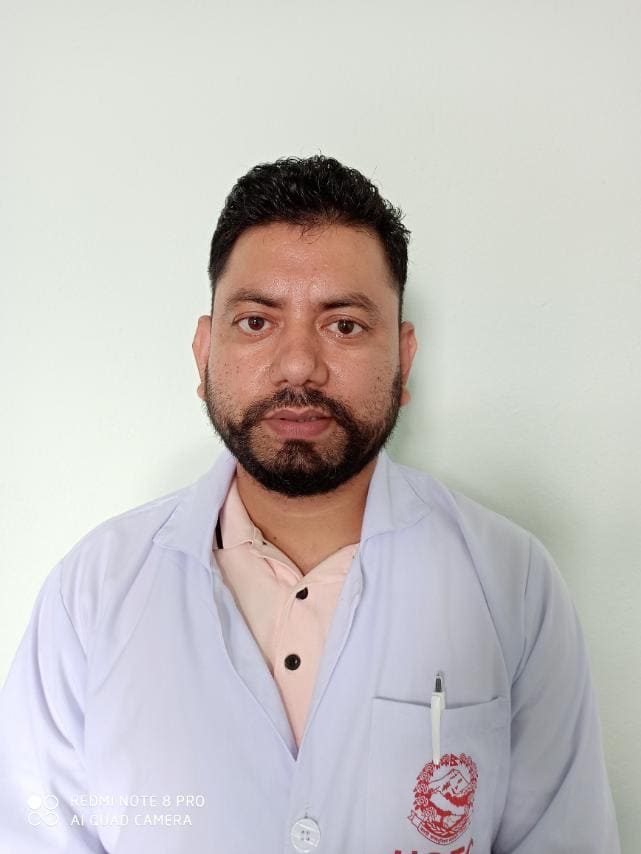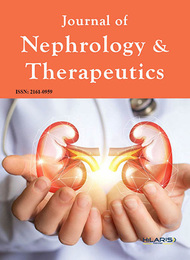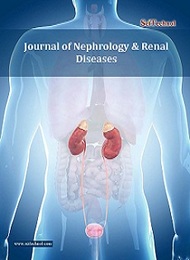Theme: Recent Diagnosis and Treatment Approaches to Nephrology and Dialysis
Nephrologists Meeting 2020
Webinar on Nephrologists Meeting
Date: December 12, 2020
(Theme: Recent Diagnosis and Treatment Approaches to Nephrology and Dialysis)
Welcome to Webinar on Nephrologists Meeting 2020!
Following wondrous success of Global Nephrologists Meet Webinar 2020 which was held on October 15, 2020 we are privileged to announce our upcoming Webinar on Nephrologists Meeting will be held on December 12, 2020 as a virtual meeting and same will be repreated on January 18, 2021. We cordially invite all the participants who are interested in sharing their knowledge and research in the arena of Nephrology and Dialysis.

Nephrologists Meeting 2020 is the platform where you can avail a chance to meet experts and authorities from all over the world. It’s your time to grab the opportunity to join a group of Speakers, Discussion, Young researcher presentation, Delegate, Networking and extra benefits. Nephrologists Webinar aims to gather academic scientists, researchers and research scholars to interchange and share their researches and experiences on all the aspects of Kidney and renal medicine.
Who can attend?
- Pediatric Nephrologists
- Renal Physicians
- Kidney Transplant Surgeons
- Nephrology Fellows & Nurses
- Dialysis Technicians
- Medical Students
- Dialysis Centers
- Societies and Associations
- Pharma & Dialysis Equipment Manufacturers
- All researchers related to the field
Webinar Highlights:
- Chronic Kidney Disease (CKD) and Its Complications
- Dialysis and COVID-19
- Acute Kidney Injury
- Kidney Transplantation
- Urology & Urinary Tract Infections
- Diabetic Nephropathy
- Pediatric Nephrology
- Hydronephrosis and IgA Nephropathy
- Renal Pathology and Diagnostics Tests
- Nephrolithiasis and Polycystic Kidney Disease
Webinar Program Schedule will be available soon.
Webinar Program Schedule will be available soon.
Track 01: Chronic Kidney Disease (CKD) and Its Complications
Chronic kidney disease (CKD) is a condition in which a person has damaged kidneys or reduced kidney function for more than 3 months. Risk factors for CKD include diabetes, high blood pressure, heart disease, obesity, high cholesterol, lupus, and a family history of kidney disease. Diabetes and high blood pressure are the most common causes of kidney failure. Presence of proteinuria is associated with increased risk of progression of CKD and death. Complications include anemia due to reduced production of erythropoietin by the kidney; reduced red blood cell survival and iron deficiency; and mineral bone disease caused by disturbed vitamin D, calcium, and phosphate metabolism. CVD represents the leading cause of mortality in CKD patients, and the prevalence and burden of this complication increases with declining kidney function. In CKD stages 4 to 5, and possibly in CKD stage 3, there is loss of defense against both sodium excess and sodium depletion. Metabolic acidosis is common in CKD and is caused when the acid intake and generation exceed the renal acid excretion. Research into CKD complications over the last few decades has been largely focused on the management of endocrinological abnormalities (anemia and secondary hyperparathyroidism).
Nephrology Conferences | Nephrology Webinars 2020 | Euro Nephrology Online Events | Nephrology Conference Online Webinar | Dialysis Conferences | Scientific Webinars on Nephrology and Urology | Renal Conferences | Clinical Nephrology Conferences | Kidney Transplant Conferences | Urology Conferences | Best Chemistry Podcasts 2020 | Nephrology Conferences 2020 Europe | Kidney Disease Conferences | Nephrology Webcast | Chronic Kidney Disease Conferences | Renal Failure Conferences | Nephritis Meetings
Track 02: Dialysis and COVID-19
COVID-19, a disease affected by a novel corona virus (SARS CoV-2) is currently a pandemic, which produces high morbidity in the elderly and in patients with allied comorbidities. A small proportion of patients (nearly 5%) of COVID – 19 develop AKI. The disease is usually mild but a small number may require Renal Replacement Therapy. In addition, even smaller proportion of patients with secondary bacterial infection will have septic shock, drug nephrotoxicity or fading of existing CKD severe enough to need Renal Replacement Therapy. Patients who are already receiving peritoneal dialysis (PD) treatment have the relative advantage over patients who are receiving hospital or satellite-based haemodialysis treatment as they will not be exposed to hospital environment.
Nephrology Conferences | Nephrology Webinars 2020 | Euro Nephrology Online Events | Nephrology Conference Online Webinar | Dialysis Conferences | Scientific Webinars on Nephrology and Urology | Renal Conferences | Clinical Nephrology Conferences | Kidney Transplant Conferences | Urology Conferences | Best Chemistry Podcasts 2020 | Nephrology Conferences 2020 Europe | Kidney Disease Conferences | Nephrology Webcast | Chronic Kidney Disease Conferences | Renal Failure Conferences | Nephritis Meetings
Track 03: Acute Kidney Injury
AKI is a condition in which the glomerular filtration rate is abruptly reduced, affecting a sudden retention of endogenous and exogenous metabolites (urea, potassium, phosphate, sulfate, creatinine, administered drugs) that are normally cleared by the kidneys. Acute kidney injury and its immediate complications, such as water retention, high acid and potassium levels in the blood, and increased urea nitrogen in the blood, can often be treated successfully. Typically, prognosis is favorable for people whose acute kidney injury is due to decreased blood flow because body fluids have been lost through bleeding, vomiting, or diarrhea—conditions that are reversible with treatment. Some complications of acute kidney injury are serious and may even be life-threatening. People may need to be treated in a critical care unit (also called an intensive care unit, or ICU). Acute kidney injury may be prolonged, necessitating removal of waste products and excess water. Waste removal can be done through dialysis, usually hemodialysis.
Nephrology Conferences | Nephrology Webinars 2020 | Euro Nephrology Online Events | Nephrology Conference Online Webinar | Dialysis Conferences | Scientific Webinars on Nephrology and Urology | Renal Conferences | Clinical Nephrology Conferences | Kidney Transplant Conferences | Urology Conferences | Best Chemistry Podcasts 2020 | Nephrology Conferences 2020 Europe | Kidney Disease Conferences | Nephrology Webcast | Chronic Kidney Disease Conferences | Renal Failure Conferences | Nephritis Meetings
Track 04: Kidney Transplantation
Kidney transplantation or renal transplantation is the organ transplant of a kidney into a patient with an end organize kidney diseases. Kidney transplantation is commonly named extinct donor known as cadaveric or living donor transplantation be deep-set on the wellspring of the giver organ. Living donor kidney transplants are formerly differentiated as non-related living transplants or, living associated transplants contingent upon whether a biological relationship occurs between the kidney donor and kidney recipient. Exchanges and chains are an innovative way to deal with nurtures the living donor pool.
Kidney Transplantation recipients
Living donors of kidney
Renal replacement therapy
Renal function in living kidney donors
Kidney Biopsy
Deceased donors
Kidney paired donation
Compatible kidney
Kidney exchange
Immunosuppression
Kidney pancreas transplant
Post-transplant lymphoproliferative disorder
Transplantation rejection
Artificial Kidney
Nephrology Conferences | Nephrology Webinars 2020 | Euro Nephrology Online Events | Nephrology Conference Online Webinar | Dialysis Conferences | Scientific Webinars on Nephrology and Urology | Renal Conferences | Clinical Nephrology Conferences | Kidney Transplant Conferences | Urology Conferences | Best Chemistry Podcasts 2020 | Nephrology Conferences 2020 Europe | Kidney Disease Conferences | Nephrology Webcast | Chronic Kidney Disease Conferences | Renal Failure Conferences | Nephritis Meetings
Track 05: Urology & Urinary Tract Infections
Urinary tract infections are among the most common of bacterial infections. They occur in people of all ages, women significantly more than men. The urinary system consists of the kidneys, ureters, bladder, and urethra. Most UTIs arise from bacteria that usually live in the colon and rectum, and are present in bowel movements. These bacteria cling to the opening of the urethra, begin to multiply, and travel up to the bladder. Symptoms may include a frequent urge to urinate, regardless of whether the bladder is full or empty, and pain and burning with urination. The urine itself may look milky or cloudy, or have a strong smell.
Nephrology Conferences | Nephrology Webinars 2020 | Euro Nephrology Online Events | Nephrology Conference Online Webinar | Dialysis Conferences | Scientific Webinars on Nephrology and Urology | Renal Conferences | Clinical Nephrology Conferences | Kidney Transplant Conferences | Urology Conferences | Best Chemistry Podcasts 2020 | Nephrology Conferences 2020 Europe | Kidney Disease Conferences | Nephrology Webcast | Chronic Kidney Disease Conferences | Renal Failure Conferences | Nephritis Meetings
Track 06: Pediatric Nephrology
In the pediatric and neonatal intensive care units acute kidney injury (AKI) is a common complication where renal transplantation therapy is commonly implemented in children in whom the supportive therapy is not to the mark to touch the metabolic demands. In majority, peritoneal dialysis is more preferred for children in the times of renal transplantation because of the non-complexity of the procedure. In most of the pediatric end stage renal nephrology disease, peritoneal dialysis is more preferred as it can be done even in home.
Nephrology Conferences | Nephrology Webinars 2020 | Euro Nephrology Online Events | Nephrology Conference Online Webinar | Dialysis Conferences | Scientific Webinars on Nephrology and Urology | Renal Conferences | Clinical Nephrology Conferences | Kidney Transplant Conferences | Urology Conferences | Best Chemistry Podcasts 2020 | Nephrology Conferences 2020 Europe | Kidney Disease Conferences | Nephrology Webcast | Chronic Kidney Disease Conferences | Renal Failure Conferences | Nephritis Meetings
Nephrologists Meeting deals with study of kidneys as well as its illnesses like normal kidney function, kidney problems, the treatment of kidney stone problems and renal replacement therapy, CKD which are common like hemodialysis and kidney transplantation. Kidney function studies: Improved levels of blood urea nitrogen and creatinine are the hallmarks of acute renal failure. Systemic illnesses that affect the kidneys as diabetes and autoimmune disease and systemic complications that occur as a result of kidney problems as renal osteo-dystrophy and hypertension are also planned in nephrology. Webinar on Nephrologists Meeting 2020 will discuss the latest skills and therapeutic features developed for various kidney diseases which include renal transplantation, dialysis equipment’s and other procedures complicated in treatment of Chronic Kidney Diseases and End Stage Renal Diseases.
Nephrologists Meeting 2020 welcomes world class nephrologists and kidney specialists from leading universities and research institutions making the conference a perfect podium to share experience, foster collaboration across industry and academic circles, and evaluate emerging technologies across the world.
According to fresh statistics report, nearly 26 million adults apart from young and old aged individuals are suffering from Chronic Kidney Disease illnesses and millions of others are at increased risk. The totals of Kidney transplantations are apparently very high and, in the year of 2015, alone, there are around 15000 kidney transplantations. Due to the rapid growth for the risk of renal disorders, Nephrologists Meeting 2020 aims to decrease the incidence rate of kidney disease through its international conference on nephrology and cordially invites participants across the globe to deliberate and arrive under possible solutions for one of the major critical problems of mankind.
Scope and Importance of Nephrology Research
Webinar on Nephrologists Meeting has been fostering the need to control the impact of permanent renal disease within the public health environment. The lack of a systematized regulator provided through a measurable program has greatly impacted on the level of hospital expense since they have improved their case-mix risk, family economies deteriorate and health care pays for a higher morbidity mortality that could be avoided with better investigation and epidemiological control.
Members Associated with Nephrology Research
There are more than 1,00,000 professional members from 126+ countries. In addition, with eminent scientists from across 120 countries, Directors & CEO’s, Post Docs, Researchers, Physicians including transplant surgeons, Directors & Brand Manufacturers/ Marketers of Consumer Products Immunologists, Professors and Students from the field of Nephrology.
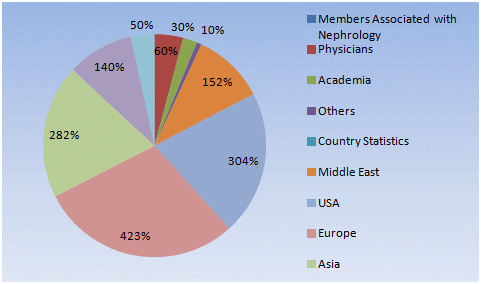
Hospitals Associated with Nephrology Research
There are several hospitals which offer kidney treatments including dialysis and transplantation. They are well known for health care and fast recovery is promised from the hospital combined with a pleasant and suitable caring atmosphere. According to the global statistics they were nearly 11500 Hospitals in cites associated with kidney treatments and 17000 doctors of Middle East working in the hospitals.
Societies Associated with Nephrology Research
Nephrology Societies leads the fight against kidney infection by educating health professionals, sharing new knowledge, advancing research, and advocating the highest quality care for patients. As per the statistics they were 9,000 Nephrology societies across the globe.
Major Nephrology Societies around the Globe
International Society of Nephrology (ISN)
American Society of Nephrology (ASN)
Japanese Society of Nephrology (JSN)
Indian Society of Nephrology (ISN)
Canadian Society of Nephrology (CSN)
Hong Kong Society of Nephrology (HKSN)
Australian and New Zealand Society of Nephrology (ANZSN)
Malaysian Society of Nephrology (MSN)
National Kidney Foundation (NKF)
Saudi Society of Nephrology and Transplantation (SSN&T)
Industries Associated with Nephrology Research
Profiles of 1600 leading Industries out of 35 production and functional industries were tangled with each component of this diagnostic system is designed and developed with utmost engineering using most advanced technology considering the requirements of clinicians engaged in interventional procedures.
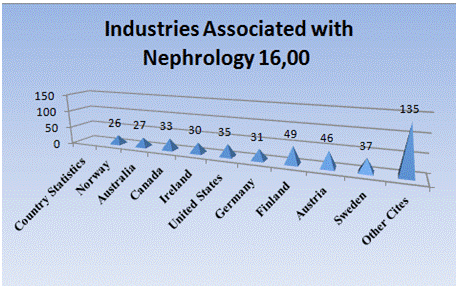
Universities Associated with Nephrology Research
Albany Medical College
Boston University School of Medicine
Columbia University College of Physicians and Surgeons
David Geffen School of Medicine at UCLA
Florida State University College of Medicine
Georgetown University School of Medicine
Indiana University School of Medicine
Johns Hopkins University School of Medicine
Loma Linda University School of Medicine
Northeastern Ohio Universities College of Medicine
Ohio State University College of Medicine
Tulane University School of Medicine
University of Maryland
Vanderbilt University School of Medicine
Weill Cornell Medical College
Yale University School of Medicine
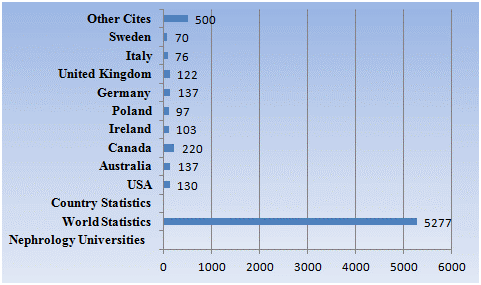
Market Value on Nephrology Research
The global nephrology market will grow from nearly $3.8 billion in 2012 to $4 billion in 2013. In 2014 to be worth $6.3 billion for a compound annual growth rate (CAGR) of 2.7%.This year, the global market for products used in the fight against kidney diseases will be worth an estimated $5.5 billion, according to a new technical market research report, the Global Nephrology Market, from USA Research. Market revenue is forecast to increase at a five-year compound annual growth rate (CAGR) of 8% from 2013 to 2018, totaling nearly $6 billion in 2018, and it is estimated that on an average 25% of the population throughout the world will be effected with Kidney Diseases by 2025 according to source.
Market Growth of Nephrology Research in the last and upcoming ten years
The growth in the number of training programs and slots has likely been driven by a variety of factors, including a perceived workforce shortage, efforts by both academic and private practice nephrologists to enhance their own workforce to meet clinical demands, and the laudable desire to develop and maintain teaching programs by both academic and practicing nephrologists. This increase in training slots has led to a dramatic increase in nephrologists. Between 2015 and 2020, nephrology grew more rapidly than any internal medicine subspecialty other than geriatrics. The increasing number of graduating trainees and practicing nephrologists may in the near future, if it has not already, lead to a sluggish job market for new trainees.
Products manufactured by the industry related Nephrology Research and its Market Value in Japan:
- Japanese Society of Nephrology
- The Japan Diabetes Society
- International Kidney Evaluation Association Japan
- The University of Tokyo Hospital
Fund Allotment to Nephrology Research
Being one of the major fields of Internal Medicine, Nephrological research received a funding of more than 5 billion dollars annually across the globe. Nearly $560 million is being funded on Kidney diseases alone per year. The maximum level of funding is $80,000 per year in Middle East and shall be used principally to support the global development as well as training-related expenses.
Statistics of Marketers, Researchers and Academicians working on Nephrology
The Webinar on Nephrologists Meeting gathers renowned scientists, physicians, surgeons, young researchers, industrial delegates and talented student communities in the field of nephrology under a single roof where networking and global partnering happens for the acceleration of future research.
Conference Highlights
- Chronic Kidney Disease (CKD) and Its Complications
- Dialysis and COVID-19
- Pediatric Nephrology
- Polysystic Kidney Diseases
- Nephrolithiasis and Polycystic Kidney Disease
- Renal Pathology and Diagnostics Tests
- Hydronephrosis and IgA Nephropathy
- Kidney Transplantation
- Urology & Urinary Tract Infections
- Acute Kidney Injury
To share your views and research, please click here to register for the Conference.
To Collaborate Scientific Professionals around the World
| Conference Date | December 12-12, 2020 | ||
| Sponsors & Exhibitors |
|
||
| Speaker Opportunity Closed | |||
| Poster Opportunity Closed | Click Here to View | ||
Useful Links
Special Issues
All accepted abstracts will be published in respective Our International Journals.
- Journal of Clinical & Experimental Nephrology
- Journal of Nephrology & Therapeutics
- Journal of Nephrology & Renal Diseases
Abstracts will be provided with Digital Object Identifier by











